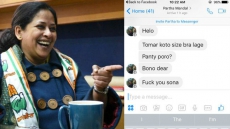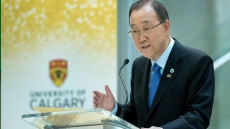OTTAWA — Australia's deadlocked election last winter has been held up as a grim example of the chaos that could be unleashed in Canada were this country to adopt a system of ranked ballots — as Prime Minister Justin Trudeau at one time openly preferred.
Instability. A plethora of tiny, extremist or vanity parties. Unholy alliances among the micro-parties that wind up holding the governing party to ransom.
There's just one problem with the warnings: neither Trudeau nor anyone else thus far has suggested that Canada adopt the Australian model.
In fact, Australia has two different voting models — a simple ranked ballot system for its House of Representatives (equivalent to Canada's House of Commons) and a single transferable vote system (STV) for its elected Senate (Canada's Senate is appointed).
STV is actually a complex form of proportional representation, which includes a ranked ballot. Yet some of the purported dire consequences of adopting a simple ranked balloting system here have been based on the worst features of Australia's Senate elections.
"The ranked ballot in the Senate in Australia is a proportional system and that's why typically you have quite a few independents and small parties, like the Green party, represented in the Senate," says Arend Lijphart, professor emeritus at the University of California San Diego and a world-renowned expert on voting systems.
"The (simple) ranked choice ballot for ... the House of Representatives, that has worked in Australia for a long time."
Under a simple ranked ballot system, voters indicate their first, second and subsequent choices. If no candidate wins more than 50 per cent of the vote, the contender with the fewest votes is dropped from the ballot and his or her supporters' second choices are counted. That continues until one candidate emerges with a majority.

Australia has added a couple of unique wrinkles.
For both its lower and upper houses, voters are required to sequentially number every candidate on the ballot, from first to last choice. Failure to number each of them results in a spoiled ballot.
Conservative democratic institutions critic Scott Reid has accused Trudeau of planning to impose the same requirement in Canada, aimed at rigging elections to the Liberals' perpetual advantage and, thus, "destroying our democracy."
In fact, Trudeau has never suggested mandatory ranking of all candidates, nor have any of the experts who have testified before the Commons committee on electoral reform.
Lijphart, who is scheduled to testify later this month, calls Australia's mandatory ranking requirement "silly."
"It's not necessary and I think it's undesirable," he says, adding that it's easy for voters to make mistakes.
Other jurisdictions allow voters to rank however many preferences they want, including just their first choice. Lijphart notes that Ireland has successfully used that kind of ranked ballot system for its presidential elections for almost a century.
For Senate elections which can entail dozens of candidates on the ballot, Australia has instituted an alternative to numbering every single contender, allowing voters to rank their choice of parties — or even just indicate their first choice party — instead. That's called "above the line" voting.
Above the line voters effectively allow the parties to determine their preferences for them. If someone, for example, marks the Purple party as the first choice but Purple's candidate gets few votes and is dropped off the ballot, that voter's second and subsequent choices are allocated automatically according to Purple's predetermined voting preferences.

This has resulted in deals being cooked up between parties to support each other as second choices and has led to some surprise wins by minor contenders who had little support on their own.
"I think these problems are basically unnecessary. You don't need to introduce those if you want reform in Canada," says Lijphart.
Again, neither Trudeau nor anyone else has advocated adoption of above the line voting here.
Political parties are in "such bad odour," Wilfrid Laurier University political scientist Brian Tanguay says any reform that smacked of party manipulation of the system — including above the line voting — would be "a non-starter" in Canada.
A LOOK AT THE PROS AND CONS OF THE VOTING SYSTEM ONCE TOUTED BY TRUDEAU

OTTAWA — Justin Trudeau has promised that last fall's federal election will be the last conducted under the first-past-the-post voting system.
In the past, the prime minister has expressed a preference for replacing FPTP with a system in which voters rank their choices on the ballot, although he has since said he is also open to some form of proportional representation (PR).
Under a ranked ballot, voters mark their first, second and subsequent choices. If no candidate wins more than 50 per cent of the vote, the contender with the fewest votes is dropped from the ballot and his or her supporters' second choices are counted. That continues until one candidate emerges with a majority.
Ranked balloting remains one of the options under consideration by a Commons committee, which resumes its study of potential new electoral models next week.
Here's a look at the pros and cons of ranked ballots:

PROS
— Relatively easy for voters to understand, less complicated than PR models.
— Relatively easy to implement, would not require redistribution of riding boundaries or an increase in the number of MPs.
— Ensures no candidate wins a seat without garnering more than 50 per cent of the vote.
— Reduces the need for strategic voting. Voters can follow their hearts and rank smaller parties first, without fear that they're "wasting" their votes on parties with no hope of forming government or that they're inadvertently helping a party they don't want to win.
— Compels parties to try to broaden their appeal to attract second choice support.
CONS
— Does not result in a distribution of seats proportional to each party's share of the popular vote. Majorities can still be won with less than 50 per cent of the vote.
— One candidate in each riding will win; everyone else loses. Voters whose first choices lose could still feel their votes didn't count.
— Could make it harder for fledgling parties to break through and win a seat. Under FPTP, a small party can win a seat with less than 40 per cent of the vote. Under a ranked ballot, it would have to win more than 50 per cent.






